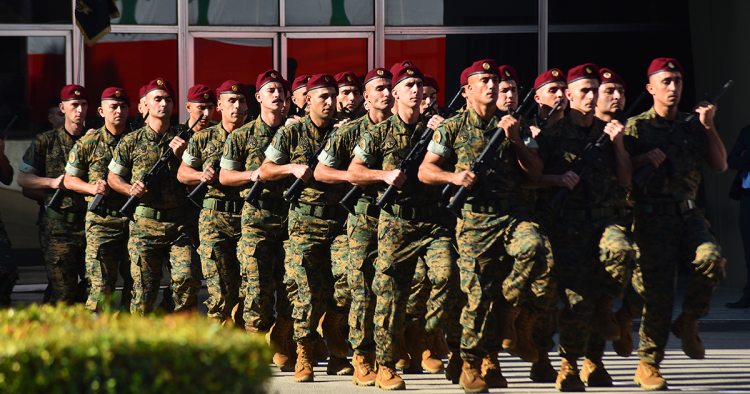In January 2023, the United States began to reroute $72 million of assistance to Lebanon to support the salaries of Lebanese soldiers and police officers, most of whom could barely make ends meet due to the disastrous economic situation in the country. It took Washington more than two years to make that decision, partly because US laws regarding this type of aid were slightly unclear. But more importantly, the voices inside and outside the US government who argued against further support to the Lebanese Armed Forces (LAF), let alone direct cash assistance, succeeded in delaying the process. This was yet another example of how, despite continued US commitment to the LAF through successive administrations, the US military assistance program remains vulnerable to US domestic politics.
There are several reasons why the debate in Washington about US assistance to the LAF is contentious, especially during the Trump administration. Some of it is legitimate and some much less so. With the former set of reasons in mind, I argue that those criticizing US assistance to the LAF fairly have reached inaccurate conclusions, because they have confused overall US policy toward Lebanon with US military assistance to the LAF. The latter is undoubtedly a big part of the former, but they require distinct evaluation.
US policy toward Lebanon has struggled in many respects, but US assistance to the LAF over the past 15 years, if judged by its ability to boost the cohesion and effectiveness of the LAF, has been quite successful. The fact that the LAF has not been able to effectively contain Hezbollah, secure all the country’s borders, or enforce United Nations Security Council (UNSC) resolutions related to Lebanon is not proof of the failure of US assistance to the LAF. Rather, it is proof of the deep ineptitude of the entire Lebanese political system, which itself has hamstrung US policy.
The LAF does not operate in a political vacuum. It does not decide which military or political battles to fight and which responsibilities to assume. LAF Commander General Joseph Aoun is not an independent operator, or someone whose accomplices run the Lebanese government. He strictly responds to civilian guidance, which barely exists, and he requires the support of the Lebanese cabinet, which is inadequate at best. So, when the Lebanese government is divided, incompetent, or even nonexistent – all of which has been the case over the years – both the LAF and US policy face tremendous obstacles.
Be it the issue of Hezbollah’s arms, the security of the Lebanese borders, or the enforcement of UNSC resolutions, each of these regional challenges is the responsibility of none other than the Lebanese government. Like any other regular military worldwide, the LAF receives orders and then executes if it has the necessary resources. It does not formulate policy, nor does it act on its own.
In this new strategic environment of reduced US military posture across the Middle East and renewed US emphasis on security partnerships, a major objective of US military assistance programs in the region is, or at least should be, to help develop the capabilities of the local army or security force friendly to Washington. Whether those capabilities are effectively used and leveraged to accomplish shared security objectives is a separate matter, and will depend first and foremost on the political willingness and capacity of the Lebanese authorities.
In other words, the right way to judge US military assistance to the LAF is by measuring improvements to the latter’s military effectiveness. Containing Hezbollah, ensuring border security, or enforcing international law are policy objectives that should be defined by and require the political consensus of the Lebanese government. However, such a consensus has been lacking due to acute disunity and political dysfunction in Beirut.
Therefore, if enhanced military effectiveness is the more accurate metric of success of US assistance to the LAF, is there enough evidence that the latter is now more capable as a result of the former? The answer is yes. A look at three major battles the LAF fought over the past 24 years – Dinniyeh, Nahr al-Bared, and Fajr al-Jouroud – supports this conclusion. In Dinniyeh and Nahr Al-Bared, the LAF fought without significant US military assistance and the fallout was evident. In Fajr Al-Jouroud, more than 10 years of US support clearly transformed the LAF from a weak force to a professional and competent army, according to public testimony by US military leadership.
Before discussing all three battles in greater detail, it is important to reiterate and reinforce that the only reason why we are able to assess the performance and military evolution of the LAF over the years is because there was, and still is, sufficient political consensus in the Lebanese government on the issue of confronting the threat of Sunni radical militancy.
This report was originally published by the Issam Fares Institute for Public Policy & International Affairs
Photo by Fadel Itani/NurPhoto via Getty Images
The Middle East Institute (MEI) is an independent, non-partisan, non-for-profit, educational organization. It does not engage in advocacy and its scholars’ opinions are their own. MEI welcomes financial donations, but retains sole editorial control over its work and its publications reflect only the authors’ views. For a listing of MEI donors, please click here.













